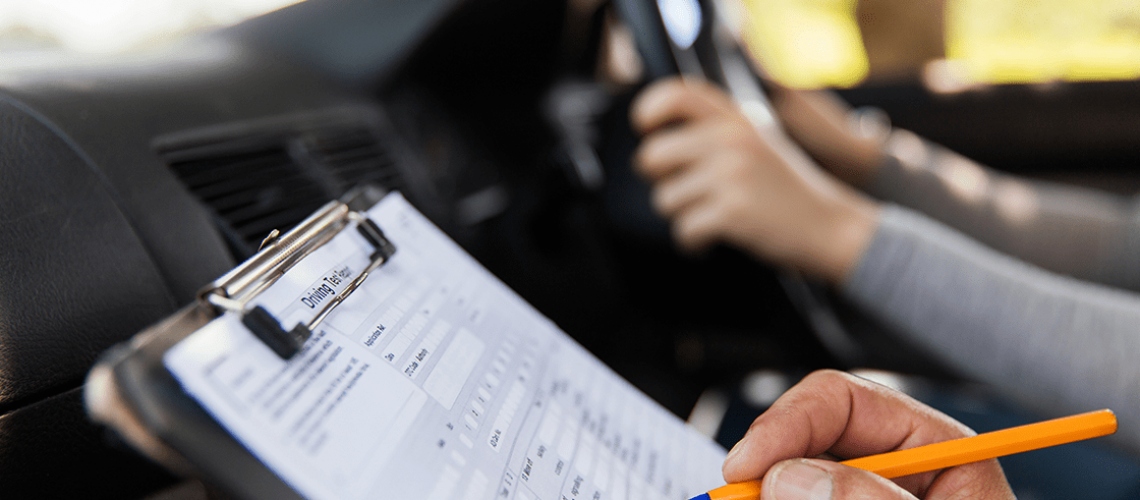The time has come — it’s finally the moment that your teenager gets to learn how to drive. For most teens, this news is met with excitement and anticipation, knowing that freedom is so close at hand. For parents, however, embarking on teen driver training can be challenging, exhausting, and a little bit scary. The entire goal of teaching teenagers to drive is to be safe on the road and to eventually pass their DMV driving test. This test relies upon knowledge of road signs, traffic rules, and safe navigation on roadways with other drivers. This process can feel intimidating and nerve-wracking, but with the right amount of preparation and practice, you can ace your test on the first try and hit the road in no time.
Whether you’re a teenager or a late learner, these steps will help you to prepare for your big day and ensure that you pass your driver’s test with flying colors.

Teen Driver Training
When first learning how to drive, it’s essential to find a reliable driver’s training course. Both online driver’s ed and in-person classes are available, depending on where you live and what works best for your schedule. Here are 7 ways to prepare your teen driver for driver’s ed and their driver training test.
1. Research and Register for Teen Driver Training
The first step toward getting your driver’s license is signing up for the appropriate classes. A combination of in-person and online lessons can help familiarize you with all the material you’ll need to know come test day. In a teen driver education course, you will learn the key parts of your vehicle, laws, and regulations, and safe driving practices. Some courses offer classroom learning opportunities as well as instructor-led driving practice out on the road.
2. Practice What You Learn
Practice makes what you’re learning in class become second nature when you’re out on the road. The first DMV test that you’ll have to pass is the written test, which tests your knowledge of road safety, traffic laws, insurance requirements, and other state-specific driving laws. Make sure to take some mock tests beforehand so you’re not surprised by any questions that might pop up. These tests are designed to simulate the exact type of questions you might encounter while providing answers and explanations along the way.
Many teen driver training classes give students practice tests in order to simulate what the official written test is like. There are also practice written tests that are available online.
3. Track Your Progress
Learning any new skill can make you feel like you aren’t progressing fast enough. Skills like driving require attention, physical movement, and spatial awareness, all of which can be new and challenging to master at the same time. If you’re getting discouraged, don’t worry! You’ve progressed farther than you realize in just a few weeks of classes.
At many driving schools, your instructor keeps a log of your progress to help track which skills you need to develop further. If you’re wondering how to get your driver’s license or what information you need to brush up on, it’s a great idea to record your progress for yourself by taking quick notes after lessons or mock exams. Additionally, if you are struggling with something in class, enlist the help of your parents or friends to work on that skill outside of the classroom.
4. Practice Makes Perfect
As with any skill, it takes time to get better at driving. There’s an incredible amount of information to take in at every moment. Maintain your speed, check your mirrors for surrounding vehicles, watch for traffic signs, and look out for pedestrians or other unexpected things in the road are just a few of the tasks you will be expected to perform simultaneously.
Ultimately, the only way to hone your skills as a driver is to spend as much time behind the wheel as possible. This will allow you to encounter a variety of driving conditions and situations and practice reacting to them.
Additionally, it will be helpful to practice driving in locations that you are already familiar with. Drive to the grocery store you go to the most often, or restaurants that you frequent. Drive your normal route to school, and take a different route back if you can. While you do eventually want to venture into less familiar territory, starting with where you know best is a good place to start.
5. Familiarize Your Surroundings
If you know that your driving test will take place in a neighborhood or town that you don’t visit often, you should familiarize yourself with the area beforehand. You don’t want to be caught off-guard by an unexpected stop sign or a lane where you need to merge quickly. Knowing the area will help you feel more confident and comfortable in front of the examiner.
Sometimes teen driver training will allow you to venture into neighborhoods you wouldn’t normally drive-in, which is a great way to start learning how to pay attention to other cars, road signs, construction areas, and other common driving situations.
6. Take Time to Rest
Your brain retains more information when you get an adequate amount of rest. During driver’s ed and the time you spend practicing your driving skills, make sure you’re also taking time to rest. Your brain will process what you’re learning much better than if you are stressed out and yawning. This means it’s also essential to get your beauty sleep the night before the driving test. Getting enough sleep will help you stay sharp at the wheel and ensure that you don’t miss questions on the written exam because you’re tired.
7. Keep Calm and Carry On
When it finally comes time to start the car or sit down for the exam, the best thing you can do is take a deep breath and remain calm. Remember that the time you spent learning the rules of the road and implementing them was time well spent! With regular mock exams and plenty of practice time in the car, the answers will come to you naturally, and you’ll have your license in no time.
Start Your Journey Towards Your Driver’s License Now
Whether you’re a first-time learner or you’ve struggled to get your license before, driving education classes and regular practice are the keys to success. It is essential to take your time learning the skills needed to pass the DMV driver’s test to make sure you fully understand the rules and regulations on the road to be a safe driver. Contact the experts at Alliance Defensive Driving School for any questions or help with choosing the best course for you.






